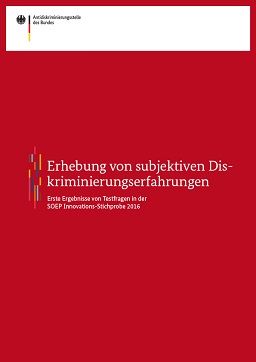Survey of subjective experiences of discrimination
Initial results from test questions in the 2016 SOEP Innovation Sample
- Factsheet on the research project -
Authors: Federal Anti-Discrimination Agency (FADA) Year of publication: 2016
Brief overview
The test questions examine the prevalence of experiences of discrimination based on all the grounds for protection listed in the General Equal Treatment Act (Allgemeines Gleichbehandlungsgesetz or AGG) over a period of 24 months before the survey was taken. They also asked about the frequency of experiences of discrimination in selected areas of life (e.g. work life, business activities and services, housing market, education, etc.). The study was part of a survey of 2,507 people participating in the Innovation Sample of the Socio-Economic Panel (SOEP-IS): The survey was carried out using Computer Assisted Personal Interviewing (CAPI) in the period from September 2016 until February 2017. These two questions were included in the SOEP-IS upon the Federal Anti-Discrimination Agency’s request. The aim of this project is to develop a module to regularly determine experiences of discrimination as part of a longitudinal survey representative of the general population, such as the SOEP.
Main results
Frequency of experiences of discrimination
- The proportion of survey respondents reporting some form of discrimination against them with respect to at least one ground in the AGG lies at 13.1 per cent overall. If experiences of discrimination are considered that do not correspond with any of the criteria included within the AGG’s scope of protection (e.g. social status), then the proportion of respondents having experienced discrimination rises to 16.1 per cent.
- The results offer significant indication of structural discrimination against particular subgroups of the population. For instance, women are about four times as likely to report gender-based discrimination (5.2 per cent) as men (1.2 per cent).
- In addition, some subgroups are shown to experience a higher risk of discrimination overall: People with a severe disability or reduction in earning capacity, for instance, not only report discrimination based on a specific disability, but also of discrimination as a whole (independent of any particular ground of discrimination).
Experiences of discrimination in selected areas of life
- The areas of life most applicable to the AGG are also named as those with the most experiences of discrimination: Just under half (48.5 per cent) of those affected by discrimination report being discriminated against in their working life, while 35.1 per cent report discrimination against them in terms of access to businesses or services.
- Based on the type of survey, no statements can be made on the frequency of experiences of discrimination on specific grounds in individual areas of life. Here the test questions should be developed further.
Correlation with life satisfaction and well-being
- Initial assessments indicate that respondents with experiences of discrimination on average rate their own life satisfaction and state of health considerably lower than people without experiences of discrimination.
- Future analyses must demonstrate to what extent these correlations hold up when controlling for other potential factors.
Options for action
Based on these test questions, it is possible to illustrate the advantages of regularly including a module on experiences of discrimination within the main SOEP survey:
- Monitoring: Regular collection of data pertaining to discrimination under the same conditions (formulation of questions, survey method etc.) would enable changes over time to be traced and evaluated.
- Panel design: Since the same people are interviewed by the main SOEP survey every year, it is possible to examine the impact of changes in respondents’ lives through their reported experiences of discrimination.
- Sample size: Many surveys experience a sampling problem due to small numbers of cases, which often prevents deeper analysis. With a sample size as large as that of the SOEP’s main survey, this is much less of an issue.
- Reporting duties: A question module on discrimination would not only provide an important source of data for AGG reporting; the Federal Government could also use the results in the context of country reporting procedures (for example, with reporting duties for the UN human rights conventions or the goals of the 2030 Agenda).

